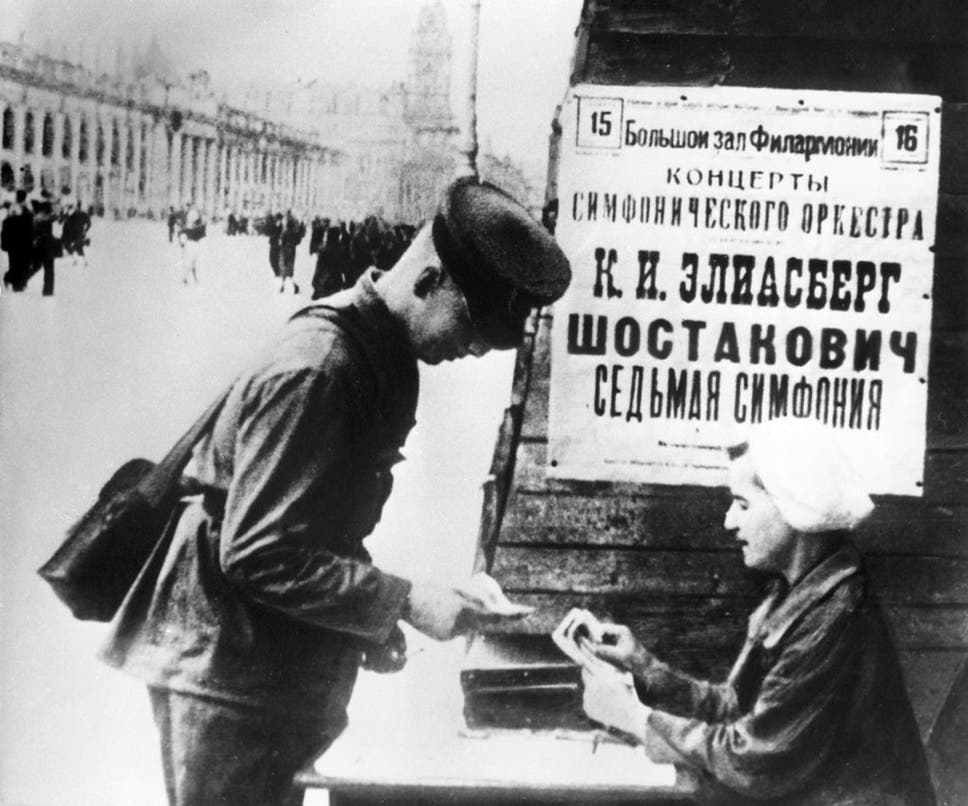Pursuing Happiness Doesn’t Guarantee It

No one knows who smuggled Symphony No. 7 out of Russia. But in an inspired flourish Dmitri Shostakovitch wrote it, start to finish, as the Nazis invaded Leningrad. The siege lasted almost 900 days and wiped out some 600,000 residents – almost a third of the pre-war population. Shostakovitch’s composition runs almost 80 minutes long and called for an unprecedented number of additional instruments, all of which were played by starving musicians, many of whom collapsed while rehearsing for its premiere.
In the summer of 1942 a microfilm of the composition found its way to London, where a BBC broadcast conducted by Sir Henry Wood commemorated Russia’s first anniversary of entering World War II – June 22, 1942. In New York a month later, Americans heard it conducted by Toscanini. And a month after that it was finally played in Leningrad itself by musicians ravaged by the ongoing siege while the Luftwaffe continued to drop bombs all over the city.
I first heard it somewhere in my 30s, probably in the midst of a job I didn’t love, and was startled by its joy. It is, in places, jubilant, self-determined, with cinematic bravado. It has more conviction than hope. It is devoid of anguish or fear or defeatism. It has unapologetically long calm pauses and quiet reprieves before upswells start roaring again. After listening to it I couldn’t believe what inspired it and the juxtaposition stuck with me.
An Irina Skripacheva survived the blockade and described hearing “The Leningrad”, This symphony had a huge impact on us. The rhythm incited a feeling of elevation, flight … At the same time we could feel the scary rhythm of the German hordes. It was unforgettable and overwhelming.”
“Russians thrive on melancholy,” one of my favorite people told me ages ago. He had been in the US for almost fifteen years at that point with no burning desire to become a US citizen. “Americans expect to be happy,” he observed without judgment. “We don’t.” He explained how most Russians, especially during the Soviet-era, were too busy working long hours, navigating overcrowded public transit and rations in grocery stores to have existential crises. “Americans have more time on their hands to overthink things and get depressed. We don’t have time for any of that.”

Years later, he is at the Portland office of the Department of Homeland Security. He has decided to become an American. He is from St. Petersburg. He works hard. When he couldn’t find work as an engineer in Canada he took on a paper route to keep himself busy. This is not to say that Americans don’t work hard. But we literally expect the American Dream in return, as though it were that transactional.
American entitlement is perhaps a festering wound, presenting in each generation more and more symptomatically. It is at his swearing in ceremony that he has his own inspired flourish, a possible explanation for the American expectation of happiness.
“It’s in your Declaration of Independence!” he tells me excitedly.
“Yes,” I laugh. “We just conveniently forget about the ‘pursuit of’ part.”
“Exactly,” he says.
Social Contract theory traces its lineage back from Locke and Rousseau to Hobbes to Socrates. But by the time ‘the pursuit of happiness’ was written into the American Declaration of Independence it had replaced the word ‘property’. Private property itself once being a radical concept, pursuing happiness was a far cry from feudalism.
“the pursuit of happiness”—which was understood to be both a public duty and a private right—evoked an Enlightenment understanding of the first principles of law by which the natural world is governed, the idea that those first principles were discoverable by humans, and the belief that to pursue a life lived in accordance with those principles was to pursue a life of virtue, with the end result of happiness, best defined in the Greek sense of eudaimonia or human flourishing. Carli N. Conklin, The Origins of the Pursuit of Happiness
Shostakovitch’s symphonic prediction of the inevitable triumph over fascism resounds decades after it premiered to the beleaguered World War II generation with the same strident mettle as the war-born Declaration of Independence. It might not guarantee you the love of your life or your dream job. Whether you’re American by birth or by naturalization you are not awarded your own sports car or mansion. But you are promised opportunity. The moral obligation of the government, your elected officials, is to protect your opportunities to pursue happiness however you may define it. And even if you could buy it the government ain’t selling. Even though you pay your taxes, this is not a transaction.
From 1823 forward, the phrase “pursuit of happiness” from the Declaration of Independence appeared in ninety-four United States Supreme Court cases. The pursuit of happiness was used by litigants to argue for everything from the right to privacy to the right to pursue one’s chosen occupation, and it was invoked by the Court to uphold the same. The most recent edition of Black’s Law Dictionary cites to that case law as it defines the pursuit of happiness as the “constitutional right to pursue any lawful business or activity . . . that might yield the highest enjoyment, increase one’s prosperity, or allow the development of one’s faculties.” Carli N. Conklin

My favorite Russian will vote as an American for the first time in the upcoming midterm elections. It won’t guarantee happiness or that he flourishes or enjoys increased prosperity or the further development of his faculties. But he has the right to vote for the elected officials and ballot measures that just might make that happen.
In bel canto, American novelist Ann Patchett wrote, “You must think like a Russian. It is a more expansive view.”
Entitlement thinking should have an inverse relationship with an expansive worldview. I think if Americans could at least just shirk the entitlement view they would, perhaps ironically, be more happy.
To hear more of the extraordinary stories behind the performance of the composition and performance of The Leningrad, read Jason Caffrey’s mosaic of a tale here for the BBC or Gavin Plumley’s emotive feature for The Independent here.